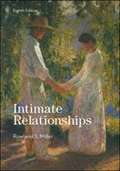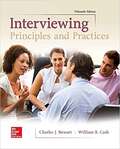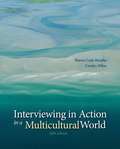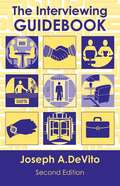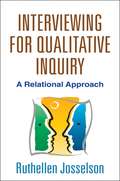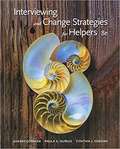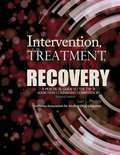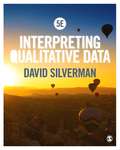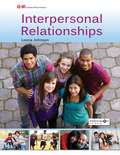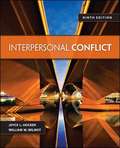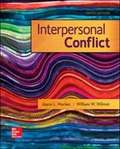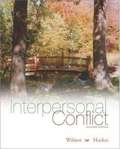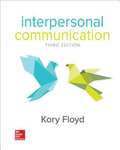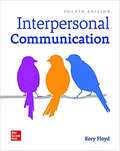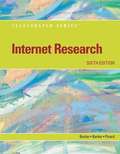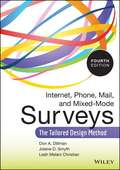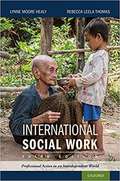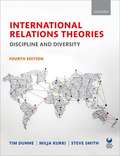- Table View
- List View
Intimate Relationships
by Rowland MillerDrawing on psychology, family studies, sociology, communication studies, and neuroscience, Intimate Relationships is a comprehensive and current overview of relationship science, written in an engaging and accessible style. Supported by SmartBookTM, McGraw-Hill’s adaptive and personalized reading experience, the eighth edition of this best-selling text includes hundreds of new discoveries and findings from the last three years, as well as over 600 new references.
Interviewing: Principles and Practices
by Charles J. Stewart William B. CashInterviewing: Principles and Practices, the most widely used text for the interviewing course, continues to reflect the growing sophistication with which interviewing is being approached, incorporating the ever-expanding body of research in all types of interview settings, recent communication theory, and the importance of equal opportunity laws on interviewing practices. <p><p> It provides the most thorough treatment of the basics of interviewing, including the complex interpersonal communication process, types and uses of questions, and the structuring of interviews from opening to closing. <p><p> The Connect course for this offering includes SmartBook, an adaptive reading and study experience which guides students to master, recall, and apply key concepts while providing automatically-graded assessments.
Interviewing in Action in a Multicultural World, Fifth Edition
by Bianca Cody Murphy Carolyn DillonThis is a text for both graduate and undergraduate students preparing to work in a variety of fields: social work, counseling, psychology, human services, criminal justice, psychiatric nursing, school counselors, and a variety of other helping professions. The book provides students with the clinical wisdom and hands-on practice to fully develop their clinical interviewing skills.
The Interviewing Guidebook (Second Edition)
by Joseph A. DevitoThe updated edition of The Interviewing Guidebook focuses on integral skills needed for successfull information-gathering and the employment interview, including the résumé and letters that are part of the interview process. Preparation worksheets, exercises, guides to online help, and scenarios for applying these skills make this brief and user-friendly book extremely practical for anyone preparing for an interview.
Interviewing for Qualitative Inquiry: A Relational Approach
by Ruthellen JosselsonEngagingly written, this book builds the reader's skills for conducting in-depth interviews designed to address a particular research question. With an emphasis on the dynamics of the research relationship, Ruthellen Josselson artfully demonstrates the steps of a successful interview. Each step is illustrated with excerpts from interviews on diverse topics. The book describes how to structure interviews effectively, develop questions that elicit meaningful narratives, cultivate skills for empathic listening and responding, avoid common pitfalls, and deal with problems that develop in an interview.Pedagogical features include:*Practice exercises adapted from Josselson's popular workshops.*Annotated examples of "good" and "bad" interviews.*A chapter on interviewing dos and don'ts.*Appendices with interview aids, sample follow-up questions, and a sample consent form.
Interviewing and Change Strategies for Helpers (Mindtap Course List)
by Sherry Cormier Paula S. Nurius Cynthia J. OsbornFully updated to reflect the latest research and issues, INTERVIEWING AND CHANGE STRATEGIES FOR HELPERS, Eighth Edition introduces you to the knowledge, skills, values, and tools needed by today's professional helpers. The book's conceptual foundation reflects four critical areas for helpers: core skills and attributes, effectiveness and evidence-based practice, diversity issues and ecological models, and critical commitments and ethical practice, using an interdisciplinary approach that reflects the authors' extensive experience in the fields of counseling, psychology, social work, and health and human services. The text skillfully combines evidence-based interviewing skills and evidence-based intervention change strategies, thus preparing you to work with clients representing a wide range of ages, cultural backgrounds, and challenges in living.
Intervention, Treatment and Recovery: A Practical guide to the Tap 21 Addiction Counselling Competencies
by Lori L. PhelpsIntroduction to the Tap; Trans disciplinary Foundation I: Understanding Addiction; Trans disciplinary Foundation II:Treatment Knowledge; Trans disciplinary Foundation III: Application to Practice; Trans disciplinary Foundation IV: Professional Readiness; Practice Dimension I: Clinical Evaluation; Practice Dimension; Practice Dimension III; Practice Dimension IV; Practice Dimension V; Practice Dimension VI: Client, Family, and Community Education; Practice Dimension VII: Documentation; Practice Dimension VIII: Professional and Ethical Responsibilities.
Interpreting Qualitative Data: Methods For Analysing Talk, Text And Interaction
by David SilvermanIn this exciting and major updating of one the most important textbooks for beginning qualitative researchers, David Silverman seeks to match the typical chronology of experience faced by the student-reader. Earlier editions of Interpreting Qualitative Data largely sought to provide material for students to answer exam questions, yet the undergraduate encounter with methods training is increasingly assessed by students doing their own research project. In this context, the objective of the Third Edition is to offer undergraduates the kind of hands-on training in qualitative research required to guide them through the process.
Interpreting Earth History: A Manual in Historical Geology
by Scott Ritter; Morris PetersenThe Eighth Edition of Interpreting Earth History continues a legacy of authoritative coverage, providing the flexibility and scope necessary to engage students with geological data from a variety of sources and scales. The authors carefully review the subjects covered in current historical geology courses and have tailored each stand-alone assignment to offer a clear, straightforward examination of pertinent topics. The content of this classroom-tested laboratory manual has been expanded and enhanced to include exercises on the Precambrian history of the Canadian Shield as well as an understanding of the stratigraphic, structural, and depositional history of North America during the Phanerozoic Eon. Now in full color, students will become more proficient in their ability to see and recognize geological patterns as well as the compositional and textural attributes of rocks and fossils.
Interplay: The Process of Interpersonal Communication
by Ronald B. Adler Lawrence B. Rosenfeld Russell F. Proctor IIWith its unique blend of compelling topics and rich pedagogy, Interplay: The Process of Interpersonal Communication, Fifteenth Edition, offers a perfect balance of research and application to help students understand and improve their own relationships. No other book prepares students better to start improving their relationships beginning with the first day of class.
Interpersonal Process in Therapy: An Integrative Model (5th edition)
by Edward TeyberThis resource for student therapists explains how to use the therapeutic relationship to help clients change. Using a wealth of real life examples including clinical vignettes and therapist-client dialogues, it demonstrates how the interpersonal process approach works. Sample topics include establishing a working alliance with the client, responding to painful feelings, developing a treatment focus, and terminating the therapeutic relationship. Teyber teaches at California State U. , San Bernardino. Annotation ©2005 Book News, Inc. , Portland, OR (booknews. com)
Interpersonal Conflict
by Joyce L. Hocker William W. WilmotInterpersonal Conflict explains the key dynamics of personal conflicts that we all face. Written for courses such as Communication and Conflict, Interpersonal Conflict, Conflict Management, Conflict and Negotiation, and Conflict in Personal Relationships, this textbook examines the central principles of effective conflict management in a wide variety of contexts--whether at home or on the job. Its combination of up-to-date research and examples gives students a theoretical and practical foundation in conflict management. Instructors and students can now access their course content through the Connect digital learning platform by purchasing either standalone Connect access or a bundle of print and Connect access. McGraw-Hill Connect® is a subscription-based learning service accessible online through your personal computer or tablet. Choose this option if your instructor will require Connect to be used in the course. Your subscription to Connect includes the following: * SmartBook® - an adaptive digital version of the course textbook that personalizes your reading experience based on how well you are learning the content. * Access to your instructor's homework assignments, quizzes, syllabus, notes, reminders, and other important files for the course. * Progress dashboards that quickly show how you are performing on your assignments and tips for improvement. * The option to purchase (for a small fee) a print version of the book. This binder-ready, loose-leaf version includes free shipping. Complete system requirements to use Connect can be found here: http://www. mheducation. com/highered/platforms/connect/training-support-students. html
Interpersonal Conflict
by William Wilmot Joyce HockerInterpersonal Conflict explains the key dynamics of personal conflicts that we all face. Written for courses such as Communication and Conflict, Interpersonal Conflict, Conflict Management, Conflict and Negotiation, and Conflict in Personal Relationships, this textbook examines the central principles of effective conflict management in a wide variety of contexts--whether at home or on the job. Its combination of up-to-date research and examples gives students a theoretical and practical foundation in conflict management.
Interpersonal Conflict
by William W. Wilmot Joyce L. HockerTextbook examines the central principles of effective conflict management in a wide variety of contexts--from romantic relationships to the workplace. Its combination of up-to-date research and examples gives students a theoretical as well as a practical foundation in conflict management.
Interpersonal Communication and Human Relationships
by Mark L. Knapp Anita L. Vangelisti John P. CaughlinThis title introduces students to interpersonal communication principles and theories through the use of commonplace experiences, such as relationships with roommates, friends and co-workers. The book aims to motivate students to critically think about their own relational communication; it also peaks student interest in social science research. <p><p>MySearchLab is a part of the Knapp/Vangelisti/Caughlin program. Research and writing tools, including access to academic journals, help students explore human communication in even greater depth.
Interpersonal Communication
by Kory FloydKory Floyd McGraw-Hill Education, 22 May 2012 - Language Arts & Disciplines - 480 pages 0 Reviews Kory Floyd's approach to interpersonal communication stems from his research on the positive impact of communication on our health and well-being. Interpersonal Communication, 2e demonstrates how effective interpersonal communication can make students' lives better. With careful consideration given to the impact of computer-mediated communication, the program reflects the rapid changes of the modern world in which today’s students live and interact. The program also helps students understand and build interpersonal skills and choices for their academic, personal, and professional lives.
Interpersonal Communication
by Kory FloydInterpersonal Communication helps students see how communication not only affects their relationships but also influences their health, happiness, and quality of life. Author Kory Floyd encourages students to go beyond commonsense notions about communication and helps them see the value of investigating interpersonal processes - both face-to-face and online - in a systematic manner.
Internships in Sport Management
by Robin Ammon Matthew Walker Edward E. Seagle Ralph W. SmithIn this book "Internships in Sport Management", students will be introduced to the concept of a "game plan for success" and provided with application exercises to help develop their own personalized plan. This cutting edge how-to-do-it manual is chock-full of real-life examples presented by previous sport management students from across the country. The authors furnish the reader with important ideas for creating an eye-opening cover letter, strategies necessary for a powerful resume, and other indispensable suggestions. The reader will develop a professional attitude and attention to detail that will ensure that the interviewee makes a positive first impression. This textbook is the ultimate tool to prepare a sport management student for that crucial internship in sport event management, intercollegiate athletics, minor league sport, sport facility management, sport marketing, sport/business and sport/entertainment industries.
Internet Research (Sixth Edition)
by Katherine Pinard Donald Barker Melissa BarkerThis book is an ideal learning tool for a wide range of learners. It provides essential information about Internet research, including topics on search toolbars, intelligent search agents, and finding, evaluating and citing online sources.
Internet, Phone, Mail, and Mixed-Mode Surveys: The Tailored Design Method (Fourth Edition)
by Don A. Dillman Leah Melani Christian Jolene D. SmythThe classic survey design reference, updated for the digital age For over two decades, Dillman's classic text on survey design has aided both students and professionals in effectively planning and conducting mail, telephone, and, more recently, Internet surveys. The new edition is thoroughly updated and revised, and covers all aspects of survey research. It features expanded coverage of mobile phones, tablets, and the use of do-it-yourself surveys, and Dillman's unique Tailored Design Method is also thoroughly explained. This invaluable resource is crucial for any researcher seeking to increase response rates and obtain high-quality feedback from survey questions. Consistent with current emphasis on the visual and aural, the new edition is complemented by copious examples within the text and accompanying website. This heavily revised Fourth Edition includes: Strategies and tactics for determining the needs of a given survey, how to design it, and how to effectively administer it How and when to use mail, telephone, and Internet surveys to maximum advantage Proven techniques to increase response rates Guidance on how to obtain high-quality feedback from mail,electronic, and other self-administered surveys Direction on how to construct effective questionnaires,including considerations of layout The effects of sponsorship on the response rates of surveys Use of capabilities provided by newly mass-used media:interactivity, presentation of aural and visual stimuli. The Fourth Edition reintroduces the telephone-including coordinating land and mobile. Grounded in the best research, the book offers practical how-to guidelines and detailed examples for practitioners and students alike.
International Trade: Theory and Policy
by Steve SuranovicInternational Trade: Theory and Policy is built on Steve Suranovic's belief that to understand the international economy, students need to learn how economic models are applied to real world problems. It is true what they say, that "economists do it with models." That's because economic models provide insights about the world that are simply not obtainable solely by discussion of the issues. International Trade: Theory and Policy presents a variety of international trade models including the Ricardian model, the Heckscher-Ohlin model, and the monopolistic competition model. It includes trade policy analysis in both perfectly competitive and imperfectly competitive markets. The text also addresses current issues such as free trade area formation and administered protection policies. The models are developed, not by employing advanced mathematics, but rather by walking students through a detailed description of how a model's assumptions influence its conclusions. But more importantly, each model and theory is connected to real world policy issues. The main purpose of the text is to provide a thorough grounding in the arguments concerning the age-old debate about free trade versus protectionism.
International Social Work: Professional Action In An Interdependent World
by Lynne Moore Healy Rebecca Leela ThomasInternational Social Work: Professional Action in an Interdependent World, Third Edition, is a comprehensive treatment of all dimensions of international social work. The authors' four-part framework includes domestic practice and policy influenced by global forces, professional exchange, international practice, and global social policy. The first section of the book explores globalization, development and human rights as foundational concepts for international social work. The text then provides an overview of global social issues and international organizations related to social welfare. Part II offers an overview of the global history of the profession. Similarities and differences in social work around the world are examined through seven country examples. Part III provides an extensive discussion of current aspects of the global profession, with chapters on ethics, social policy, international development practice, and practice at the international/domestic interface. Modalities of international professional exchange are then explored prior to a concluding chapter that provides recommendations for international action. The text is enlivened by numerous case examples, drawn from many parts of the world. The history chapters include brief biographies of noted social workers on the international scene whose accomplishments serve as inspiration for readers. The text is extensively referenced with updated professional literature and intergovernmental documents. Carefully selected items in the appendix expand the usefulness of the book.
International Relations Theories: Discipline and Diversity (Fourth Edition)
by Tim Dunne Milja Kurki Steve SmithBringing together the most influential scholars in the field, International Relations Theories: Discipline and Diversity provides unrivalled coverage of international relations theories and arguments. This best-selling text explores the full spectrum of theoretical perspectives and debates, ranging from the historically dominant traditions of realism, liberalism, and Marxism to postcolonialism and green theory. Each chapter is dedicated to a particular theory and features a case study that bridges theory and practice, showing how theory can be used to explain real world political dilemmas. Spotlights on key books and articles encourage readers to go beyond the textbook and explore important works in the field, and new case study questions encourage analytical thinking and help readers understand the value of applying theory to concrete political problems.
